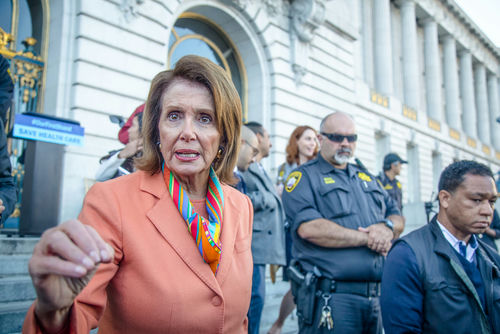Nancy Pelosi’s potential retirement stirs debate over aging leadership in Congress, highlighting partisan double standards.
Pelosi’s Health and Expected Retirement
As of May 2025, discussions about Nancy Pelosi’s retirement have intensified following reports of her significant hip injury in 2024. At 85, Pelosi’s physical health is increasingly under scrutiny, prompting discussions about her ability to continue serving effectively. Despite the lack of formal public announcement, credible sources indicate she is likely to retire at the end of her term in January 2027. Her use of a walker underscores the physical challenges she faces, reinforcing debates about the capability of aging lawmakers.
In recent years, Pelosi has stepped down from leadership roles, focusing on her duties as a representative of California’s 11th district. The broader issue of aging leadership in Congress has gained prominence, with both parties grappling with how to manage transitions and ensure effective governance. While no credible evidence points to significant cognitive decline, Pelosi’s health incident underscores the urgency of addressing age-related decline in a political landscape increasingly populated by senior lawmakers.
Partisan Double Standards and Aging Leadership
The narrative surrounding Pelosi’s retirement brings to light perceived partisan double standards, especially in calls for retirement. While some Democrats have been reluctant to press for her departure, the treatment of other senior politicians like Mitch McConnell highlights inconsistencies. McConnell, who cited health concerns in stepping down from Senate leadership, dealt with different scrutiny levels. This disparity fuels debates about the fairness and transparency of how aging politicians are treated across party lines.
As political commentators and media outlets continue to dissect Pelosi’s situation, the challenge of managing aging leadership becomes apparent. The lack of institutional safeguards to address cognitive or physical decline within Congress raises significant questions about the stability and effectiveness of governance. This issue is not only about Pelosi but reflects a broader systemic challenge that both major parties must confront to maintain public trust and legislative efficacy.
The Broader Implications of Aging Leadership
The ongoing debate over Pelosi’s potential retirement and the broader issue of aging leadership have significant implications for the future of American politics. In the short term, increased scrutiny of elderly lawmakers is likely, potentially leading to more competitive primaries in districts with aging incumbents. In the long term, this could prompt important discussions about possible reforms to address age and capacity issues within Congress, paving the way for generational turnover and renewed political dynamics.
For Pelosi’s constituents and the Democratic caucus, the potential transition in representation and leadership poses challenges and opportunities. As public debate continues, the balance between valuing experience and ensuring effective governance remains a focal point. The outcome of these discussions could shape the expectations and norms surrounding age and service in high office for years to come.
Sources:
Pelosi, 85, Is Likely to Retire at the End of Term
What We Can All Learn About Hip Health From Nancy Pelosi’s Unexpected Fall
Nancy Pelosi’s Injury Prognosis

